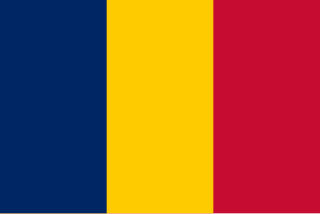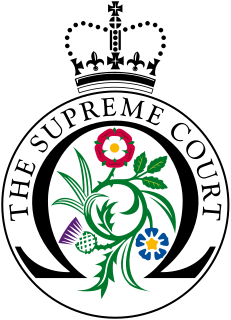Related Research Articles

The Politics of Chad take place in a framework of a presidential republic, whereby the President of Chad is both head of state and head of government. Executive power is exercised by the government. Legislative power is vested in both the government and parliament. Chad is one of the most corrupt countries in the world.

Chad, officially known as the Republic of Chad, is a landlocked country at the crossroads of North and Central Africa. It is bordered by Libya to the north, Sudan to the east, the Central African Republic to the south, Cameroon to the south-west, Nigeria to the southwest, and Niger to the west. Chad has a population of 16 million, of which 1.6 million live in the capital and largest city N'Djamena.

The European Court of Justice, formally just the Court of Justice, is the supreme court of the European Union in matters of European Union law. As a part of the Court of Justice of the European Union, it is tasked with interpreting EU law and ensuring its uniform application across all EU member states under Article 263 of the Treaty of the Functioning of the European Union (TFEU).
The Rally for Democracy and Progress is a political party in Chad, led by Lol Mahamat Choua.

The Constitutional Court of South Africa is a supreme constitutional court established by the Constitution of South Africa, and is the apex court in the South African judicial system, with general jurisdiction.

The Supreme Court is the final court of appeal in the United Kingdom for all civil cases, as well as for criminal cases originating in England, Wales and Northern Ireland. It also hears cases of the greatest public or constitutional importance affecting the whole population.
A dissenting opinion is an opinion in a legal case in certain legal systems written by one or more judges expressing disagreement with the majority opinion of the court which gives rise to its judgment. When not necessarily referring to a legal decision, this can also be referred to as a minority report.

In the United States, judicial review is the legal power of a court to determine if a statute, treaty, or administrative regulation contradicts or violates the provisions of existing law, a State Constitution, or ultimately the United States Constitution. While the U.S. Constitution does not explicitly define the power of judicial review, the authority for judicial review in the United States has been inferred from the structure, provisions, and history of the Constitution.

The Supreme Court of Justice is the highest court of law in Portugal without prejudice to the jurisdiction of the Constitutional Court.

The 2004 Chadian coup d'état attempt was an attempted coup d'état against the Chadian President Idriss Déby that was foiled on the night of May 16, 2004.

The Supreme Court is the highest jurisdiction of Chad in judiciary, administrative and tributary fields.

The Constitutional Court of the Republic of Moldova represents the sole body of constitutional jurisdiction in the Republic of Moldova, autonomous and independent from the executive, the legislature and the judiciary.
Justices of the Supreme Court of the United Kingdom are the judges of the Supreme Court of the United Kingdom other than the president and the deputy president. The Supreme Court is the highest court of the United Kingdom for civil and criminal matters in the jurisdictions of England and Wales and Northern Ireland. Judges are appointed by the Queen on the advice of the Prime Minister, who receives recommendations from a selection commission. The number of judges is set by s.23(2) Constitutional Reform Act 2005, which established the Court, but may be increased by the Queen through an Order in Council under s.23(3). There are currently 12 positions: one President, one Deputy President, and 10 Justices. Judges of the Court who are not already peers are granted the style Lord or Lady followed by a surname, territorial designation or a combination of both, for life.
Judicial interpretation is the way in which the judiciary construes the law, particularly constitutional documents, legislation and frequently used vocabulary. This is an important issue in some common law jurisdictions such as the United States, Australia and Canada, because the supreme courts of those nations can overturn laws made by their legislatures via a process called judicial review.

The Federal Constitutional Court is the supreme constitutional court for the Federal Republic of Germany, established by the constitution or Basic Law of Germany. Since its inception with the beginning of the post-World War II republic, the court has been located in the city of Karlsruhe, which is also the seat of the Federal Court of Justice.

In law, an appeal is the process in which cases are reviewed by a higher authority, where parties request a formal change to an official decision. Appeals function both as a process for error correction as well as a process of clarifying and interpreting law. Although appellate courts have existed for thousands of years, common law countries did not incorporate an affirmative right to appeal into their jurisprudence until the 19th century.

Mahamat Idriss Déby Itno, also known as Mahamat Kaka, is a Chadian army general. He is the president of the Transitional Military Council. He is the son of the late Chadian President Idriss Déby. He gained power as the acting President of Chad on 20 April 2021 when his father, Idriss Déby died in action while commanding troops in the Northern Chad offensive. He previously served as the second in-command of the military for the Chadian Intervention in Northern Mali (FATIM).

Amy Vivian Coney Barrett is an associate justice of the Supreme Court of the United States. She is the fifth woman to serve on the court. She was nominated by President Donald Trump and has served since October 27, 2020. She was a U.S. circuit judge on the U.S. Court of Appeals for the Seventh Circuit from 2017 to 2020.

Yoo Nam-seok is the 7th President of the Constitutional Court of Korea.

Chad Andrew Readler is a United States Circuit Judge of the United States Court of Appeals for the Sixth Circuit and former Principal Deputy and former Acting Assistant Attorney General for the United States Department of Justice Civil Division.